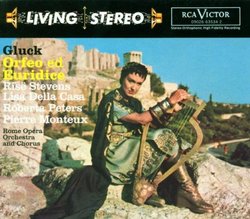| All Artists: Gluck, Stevens, Della Casa, Ropo, Monteux Title: Orfeo Ed Euridice Members Wishing: 0 Total Copies: 0 Label: RCA Release Date: 8/8/2000 Album Type: Original recording remastered Genre: Classical Styles: Opera & Classical Vocal, Historical Periods, Classical (c.1770-1830) Number of Discs: 2 SwapaCD Credits: 2 UPC: 090266353422 |
Search - Gluck, Stevens, Della Casa :: Orfeo Ed Euridice
 | Gluck, Stevens, Della Casa Orfeo Ed Euridice Genre: Classical
Orfeo ed Euridice, by Christoph Willibald Gluck (1714-1787), is one of the most enduring of 18th-century operas, and for all of the right reasons. Its story of the young Greek hero who pursues his lover into the Underwo... more » |
Larger Image |
CD DetailsSynopsis
Amazon.com Orfeo ed Euridice, by Christoph Willibald Gluck (1714-1787), is one of the most enduring of 18th-century operas, and for all of the right reasons. Its story of the young Greek hero who pursues his lover into the Underworld has all the makings of great theater and music, and was a favored topic of opera from the start. But Gluck's handling of the material surrounds the story with luscious choral and solo lines that make for two hours of thoroughly entrancing music. This release is of the 1957 classic RCA Victor recording, which features Rise Stevens as Orfeo (following the tradition of Gluck's revised version for Paris, which scored the hero for female voice, instead of castrato) and Lisa Della Casa as Euridice, with Roberta Peters as Amore. This is a dazzling recording of the complete opera that easily matches anything on the market today (especially since both latter-day accounts by John Elliot Gardiner have gone out of print). Very highly recommended. --Paul Cook Similar CDs
|
CD ReviewsA Sparkling Performance D. A Wend | Buffalo Grove, IL USA | 08/19/2004 (5 out of 5 stars) "I first learned about this recording while reading "Everyone Is Someone" by Fifi Monteux. Gluck was a favorite composer of Pierre Monteux and it shows in this recording. In these days when period instrument performances of Orfeo ed Euridice abound it may be unseemly to go back to a recording with modern instruments. However, this recording perfectly captures the spirit of the opera and the singers take a backseat to nobody. The soloists in this recording were favorites of Pierre Monteux: Rise Stevens (Orfeo), Lisa Della Casa (Euridice) and a very young Roberta Peters (Amour). The casting is superb and it is evident that each is singing at their best for the old maestro. Of particular interest is Orfeo's famous aria Che faro senza Euridice? Which is beautifully sung by Rise Stevens. The chorus is splendid but once or twice their singing was too much for the recording equipment and there is some slight distortion. Otherwise, this is a remarkable clear recording. The Dance of the Furies is played with real passion and drive, while the Dance of the Blessed Spirits is performed with just enough feeling so it does not become sugary sweet. The recording dates to June 1957, and was performed at the Rome Opera House by the Rome Opera Orchestra and Chorus. In short, this is a recording that was lovingly made and should not be missed. The booklet has an interesting article about the history of the opera and the recording in English, German and French. The libretto is included in Italian and English with cues noted and there is a synopsis of the story. " Juat 'cause I liked it madamemusico | Cincinnati, Ohio USA | 10/06/2000 (4 out of 5 stars) "I personally don't think ANY complete recording of Gluck's "Orfeo" is as good, musically, as the Act 2 recorded by Nan Merriman and Arturo Toscanini in 1952. That performance struck the right balance of cohesive conducting, proper tempo relationships, deeply-felt emotion and expressive singing. Among the various later recordings, including the "live" Janet Baker-Raymond Leppard version that others seem to find so exciting, what I mostly hear is an outstanding Orfeo (Baker, Larmore, Tourangeau, Fischer-Dieskau, Horne) surrounded by inferior singers and either overdone (Solti) or underdone (Runnicles, Leppard, Richter) conducting.This 1957 recording is conducted by Pierre Monteux (1875-1964), a past master at French music. Unfortunately, the operative word is "past." By 1957, Monteux's conducting had become somewhat erratic, slowing down romantic sections for emphasis rather than knitting the music together a la Toscanini. Nevertheless, his orchestral sound is warm and inviting, something that other conductors lack, and his pacing of the ballet music is without peer.As for the singers, they are uniformly excellent. Rise Stevens was in many ways an overrated mezzo, but she studied Orfeo with Anna Eugenie Schon-René, who was herself a pupil of Pauline Viardot-Garcia, the great Orfeo of the 19th century. Because of this, Orfeo was Stevens' signature role, the one she sang best and which won her the most acclaim. On this recording her voice shows its usual plain tone, but she sings every word and phrase with evident knowledge and understanding, if not the lieder-singer's intimacy a la Baker. Her low range is especially well-recorded. Lisa Della Casa is the best Eurydice on records, period, and her duets with Stevens are pure heaven. Roberta Peters, here making a surprise appearance as Amor, likewise sings beautifully. Between the three of them and Monteux's conducting (occasionally slow, usually quite good), it adds up to a very satisfactory "Orfeo" to my ears.Click on the excerpts and see what you think. I give it four stars because it held my interest from start to finish, and because it omits all spurious and added music not written by Gluck." AN UNDULY NEGLECTED COMPOSER MOVIE MAVEN | New York, NY USA | 04/29/2001 (5 out of 5 stars) "As with other composers, Christoph Willibald Gluck (1714-87) seems to be out of favor at the moment. Well, music like everything else, is cyclical and I have no doubt that opera-lovers who have recently discovered Handel, will soon move on to Gluck. Based on the myth of Orpheus (sung by a mezzo soprano) and his beloved wife, Euridice, who has died before the curtain rises on Act 1. Orpheus makes a trip to Hades and is allowed to bring his wife back to Earth alive, as long as they do not look at each other during the long, difficult trip home and as long as Orpheus does not explain why to his wife. They make it back to Earth and their loving marriage is blessed by the goddess Amore. It's a simple story, with, granted, not much action. But the music: The music is magnificent.Recorded in 1957, this set stars one of America's finest singers who is not nearly as well known as she should be. Rise Stevens was the finest 'Octavian' ("Der Rosenkavalier") and 'Carmen' and 'Orpheus' of her time. She was also very beautiful and even co-starred in a few movies, including the popular "Going My Way" with Bing Crosby. Her voice is near-perfect on these CD's and her dramatic ability obvious. Lisa Della Casa and Roberta Peters sing the two "female" roles wonderfully and the conductor is Pierre Monteux.True, the sound could be more pristine but it is just fine, remastered in 2000. (The CD set starring a more recent 'Orpheus,' Marilyn Horne, who is brilliant in the role, with the redoubtable Sir Georg Solti as her conductor, were remastered with even worse results.) BMG should be commended for re-releasing this opera, which is obviously not a sure bet for platinum status. HIGHLY RECOMMENDED."
|

 Track Listings (36) - Disc #1
Track Listings (36) - Disc #1


